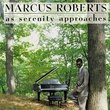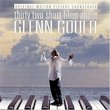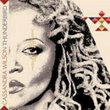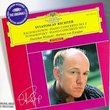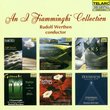| All Artists: Sarah Chang, Lars Vogt Title: Franck/Saint-Saens/Ravel: Sonatas for Violin & Piano Members Wishing: 2 Total Copies: 0 Label: EMI Classics Release Date: 5/4/2004 Genre: Classical Styles: Chamber Music, Historical Periods, Classical (c.1770-1830), Instruments, Strings Number of Discs: 1 SwapaCD Credits: 1 UPCs: 724355767929, 724355767950 |
Search - Sarah Chang, Lars Vogt :: Franck/Saint-Saens/Ravel: Sonatas for Violin & Piano
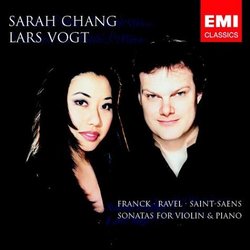 | Sarah Chang, Lars Vogt Franck/Saint-Saens/Ravel: Sonatas for Violin & Piano Genre: Classical
Chang, who made her recording debut at age 9, is now a thoroughly mature artist. She demonstrates this on the current CD in numerous ways. She has chosen an equal collaborator to share the spotlight, and she has selected a... more » |
Larger Image |
CD DetailsSynopsis
Amazon.com Chang, who made her recording debut at age 9, is now a thoroughly mature artist. She demonstrates this on the current CD in numerous ways. She has chosen an equal collaborator to share the spotlight, and she has selected an intelligent coupling of three major French Violin Sonatas which are close in time (1885-1927) but very diverse in their stylistic demands. The St.-Saëns, earliest by a year, is a romantic work, but this composer tempers his romanticism with strictly classical form and Bachian rhythmic strictness. In the Franck, these performers are rather individual in their approach, fervent enough (and very well balanced, the piano in the foreground when it needs to be) but keeping it under restraint instead of going all-out with extravagant gestures. Ravel's "blues" movement doesn't get hammed up here, as it sometimes does, but is integrated into the composer's real approach which is more neoclassical than romantic. The disc provides an excellent listening program, and hearing these performers meet the varying requirements of the pieces so well makes it a real treat to hear, in very clear and realistic sound. --Leslie Gerber Similarly Requested CDs
|
CD ReviewsMusic reminiscent of things past David H. Spence | Houston, TX | 01/13/2006 (4 out of 5 stars) "Without squarely being idiomatic within the French tradition, Sarah Chang and Lars Vogt give a frequently illuminating recital of three sonatas here. The Franck Sonata in A is the most frequently recorded of the three sonatas on this program. Lars Vogt provides a very warm, atmospheric opening to the first movement, and breaks into a kind of reverie for lyrical outpourings several places to follow (including in the third movement), even catching Chang up in the fantasy of much of the writing. Only a little too much attention to nuance a couple of times, in weightier passages, impedes the line and thus sounds self-conscious. Lars Vogt opens the difficult second movement poco marcato, and with excellent forward motion, but then half a minute in and also where this same passagework recapitulates four minutes later, listen to his shaping of sequential lines, into which he lets Chang tacitly wander in, yet without the least amount of strain toward being heard. The repeated note spiccato, approached without the least bit of hesitation and with piquant touch, Chang keeps seamless with the quiet closing theme interlude that has preceded it. Some playing at arguably at too soft a dynamic sounds a bit self-conscious a ways into the third movement, but Chang gives this music the big gesture early on, and Vogt's playing of the reprise of the opening of the sonata sounds truly impressionistic six minutes in. No movement of any of the three sonatas on this disc is more effective than the finale to the Franck. For once, even after hearing Bell, Perlman (especially affected with Argerich), and Heifetz, the lyrical subject that opens this movement sounds entirely open and not the least bit affected. Vogt extends the time on quarter note octaves on reprise of the big passages from the movement before, to avoid playing with less than firm, fully rounded tone. No other version in stereo or digital of this entire sonata gives the listener a more natural perspective on this music, apart from the Philips with Artur Grumiaux and Gyorgy Sebok (paired with the two Faure sonatas, with J P Crossley at the keyboard). Shaham/Oppitz, paired with the Saint-Saens is a viable alternative, as is to some extent Perlman/Ashkenazy, and even perhaps the too closely recorded Chung/Lupu. Bell/Thibaudet, also on Decca, is dry, antiseptic and inadequately tuned from Joshua Bell at a few critical junctures in it. For historical, continue to rely on the Thibaud/Cortot on EMI. On first listening, the music in the Saint-Saens D Minor Sonata, seems to succumb a bit to note-spinning. The two artists here, however, under closer scrutiny, sustain interest to the extent that nothing in this sonata, after repeated listening, seems to have been written in anything approaching gratuitous excess. Saint-Saens' deftly pointed manipulation of form is always ever clear, and at the same time, the insouciant charm of this music is never far away. Where Gil Shaham and Gerhard Oppitz (DGG) go for the surface brilliance of the last two movements. Vogt and Chang only fall for bombast right before the end of the finale, but moreover find a tone of introspection for the scherzo and Mendelssohnian play for the finale that elude Shaham and Oppitz. Some lovely arpeggi and mildly spectral sounding trills, to reintroduce the first theme of the adagio is especially compelling from Sarah Chang. This is a version of the Saint-Saens that, if it does not rise to definitive, is as close to getting there as possible without doing so. Five stars here. Feeling for the Ravel is a little less intimate, confident, assured than for the Saint-Saens especially, but the command of line and colour, especially in passages where it counts, is always just as assured. The most important first movement is entirely very fine, very relaxed in passages with the most sparse writing, solo violin for several pages over moving around in simple perfect fifths from the keyboard. Vogt deftly makes chimes out of parallel major sevenths, whereas Chang in more dramatic rhetoric, cascades over repeated note tremoli, following a piano part that gradually recedes from a harmonically full and dissonantly colored climax. Once having diminished back to bare bones toward the end of this passage, the music leaves Chang's closing tremoli as played near the frog, with such a chill on them to sound practically animistic. For contrast, Chang immediately follows this, with a full-toned and from Vogt long cantabile line, into which she has unobtrusively just found or woven her way "Blues" starts off just about right, loose-limbed enough, if arguably the pizzicati toward the end from Chang are plucked just a little more aggressively than may need to be the case. The perpetuum mobile finale, the first fast movement in the piece, gets its due brilliance and in sharp relief, flashes of colour that early on directly remind of the finale of the G Major Piano Concerto. A passage of less intense repeated note tremoli from Chang is noteworthy and reminds the listener of similar that has occurred in the first movement. The insightful liner notes make much of Proustian associations for especially the Franck and Saint-Saens, the Saint-Saens sonata in this context being as such to belong to, for playing it at least, Vinteuil, who plays violin in Remembrance of Things Past. The almost consistently poetic sense behind and intimate feeling that imbues so much playing on this disc, and with more detail than I can make note of here, reminisces of a better time past as well." French or fussy? Jude Ziliak | 08/01/2005 (4 out of 5 stars) "Chang has never struck me as a particularly individual player, though she is often described as bold. Like the previous reviewer, I thought her Ravel and St-Saens were good, particularly the St-Saens. The Franck suffers from an excess of restraint that sometimes is effective, but elsewhere serves no good purpose and makes the music seem flabby. Canon though it be, the fourth movement of the Franck is not tightly constructed, and benefits from a gutsier approach, emphasizing the emotional rather than structural logic of the piece. All that said, Chang's tone is uncommonly sweet, and her St-Saens is perfectly judged." Franck/Saint-Saens/Ravel: Sonatas for Violin & Piano Javier | Singapore | 03/15/2005 (4 out of 5 stars) "Sarah Chang's lyricism and command of the violin combined with french romantism worked beautifully in this cd.However with her Franck, i often feel that the piano on several ocassions overpowered the violin (especially the 4th movement) and Chang's rendition was rather weak sounding.In contrary, or amazingly, in the d-minor by saint saens, both of them worked wonderfully, were well balanced. Chang and her Del Gesu was the perfect combination for the saint saens.In the Ravel, i particularly enjoyed how Chang phrased his music. Despite the crazy compositon, everything was in place and neat."
|

 Track Listings (11) - Disc #1
Track Listings (11) - Disc #1